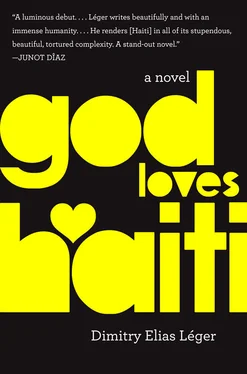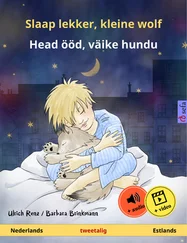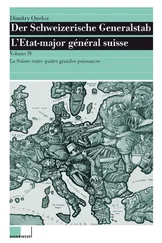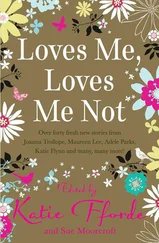The boy hadn’t moved an inch. He just stared at Alain with kindness.
Leave me alone, Alain said. I got my own problems.
The boy pretended not to hear him and continued his story. I crawled through the debris that blocked my front door, the boy said. The dark tunnel seemed to be the only way out of the house. I felt like I was in a Kirikou story. I crawled through the tunnel until I got to the street. There wasn’t much street left, as the house across the street, one of the biggest in Fort National, had collapsed into a pile of rubble onto the street as well. Every house on our block had done the same.
I don’t know what to tell you, son.
There was white dust everywhere. The goudou-goudou sound disappeared. The sounds I heard on the street were of people crying. They were crying for help. They were buried, they said. Could someone help please? they screamed. Some of the people crying were kids. I recognized the voices of some of my friends. Their voices were brightest and went silent quickest.
How did you end up here? Alain said. What’s your name anyway?
Xavier. A crowd of survivors swept me up as they clambered up and down and through the mountain of debris that had replaced the street. They were quiet. They were hurt. They shuffled more than walked. Like zombies are said to. They scared me. But I joined their stream and followed. I didn’t want to be alone. The man leading them said he would find us help. His name was Philippe. He found us this park. We walked only two blocks or so. I’m not sure. I can’t count too well yet. The wounded were too hurt to walk or be carried any further. So we stopped here.
So this crippled crew is supposed to take care of you? Where are your other relatives?
I only had a grandmother and a sister besides my mother. She was a baby. They were sleeping in the room that collapsed on my mother. The roof may have caved in on them before bringing the house down on my mother. Somehow sparing me.
Somehow sparing you. I got spared too. Ain’t we a pair of pretty motherfuckers. Look at us. I can’t walk and you’re naked with no family. I tell you, the dead are the lucky ones.
Don’t say that.
They don’t have to deal with this mess. Look around you, boy. The dead won’t get to see the city, the palace, and their brothers and sisters looking so broken.
Don’t say that!
The child’s shriek startled Alain and, seemingly, all of beleaguered Port-au-Prince, even the somnolent pigeons. The cry shattered the stiff air and mournful atmosphere of the park. The dazed crowd from Fort National around Alain and Xavier consisted of traumatized and wounded people who sat so still with wide, vacant eyes you could hardly separate the living from the dead. The child’s scream almost stirred them. Almost.
I’m sorry, Alain said to the child, opening his arm, the good one, the one that didn’t feel like it wanted to secede from his body. The boy hugged him.
As if out of thin air, three humanitarian aid workers appeared in the middle of the park turned earthquake refugee camp. They stood between the upside-down Chevy, a ragged pile of survivors, and Alain and Xavier. They were two men and a woman. They wore khaki pants, preposterous can-do attitudes, and shirts and vests featuring large red crosses. Two of them carried medical aid kits. Excitedly, the boy touched Alain’s leg and said, I told you help was coming! I told you!
After the boy ran off to join the crowd slowly forming around the aid workers, Alain Destiné discovered a familiar sensation. He felt his legs. He. Felt. His. Legs. He knew he might be able to walk again. He looked at the sky, then he looked at the hopping, giddy boy, then he looked at his legs. The boy turned around and winked at him. Again Alain looked at the boy, then he looked at the sky, and then he looked at his legs. The sky was an unmoved blanket of light blue with nary a cloud in sight. He tried to wiggle his toes, and the little bastards actually wiggled. The smile he smiled started from deep inside him before flowing through his face. His vision was blurred by a mix of tears and sweat. His chapped and dry lips cracked from stretching into a smile for the first time in a long time. Alain closed his eyes and tried to calm his heart. I still don’t forgive You, he said. But this is not a bad way to start Your comeback in my good graces.
Opening his eyes, Alain saw the boy staring right back at him, smiling. Whoa, he said. The boy was clothed. He wore a white T-shirt emblazoned with a big red cross and the word “Haiti” written in a cheerful script, and khaki shorts. Yellow-and-green sandals with a small Brazilian flag shod his feet. He carried a lollipop and had a Band-Aid on his right forearm. Alain felt bad for never having noticed the boy’s injuries. Xavier, he said, my, don’t you clean up nicely.
Around them a few other children, dressed like Xavier, chased a plastic blue-and-white soccer ball in the little bit of free space still available. They did so quietly, as if still warming to the concept of fun in their strange new world. They seemed to not to want to disturb their shell-shocked neighbors and relatives. Death had taken ownership of the city in one fell swoop. The kids rightly suspected she would not relinquish her grip gently. To fight for release from her cruel stroke, these coming days would take more energy than Alain had. He just wanted to go home, take a bath, and sleep. Maybe forever. That would be nice.
We need your help, Xavier said. The people who came to help speak only English. No one else from Fort National speaks it well enough to follow them. Philippe, my neighbor who led us here, can’t translate what they’re saying. Since you speak good English, I told them you could translate for us.
How did the boy know I spoke English? Alain thought. Not that the question mattered much. He was tired. His first and only instinct at the moment was to recoil from the world around him. He wanted nothing more than to jump into a car and hurry to his father’s house on Place Boyer and climb into his bed and lie there for a month or a year or two. That his car lay on its back and his house could be in the same shape bothered him, but not more than the exhaustion of looking so many hurt people in the face.
Everything’s going to be all right, the boy said again, as if reading his mind. Come with me.
The boy pulled Alain’s arms like he expected Alain to have the ability to get up and stand on his own two feet with no problem. Alain stood on his two feet with no problem. Merci , Alain whispered.
De rien , the boy said. Viens .
Allowing himself to be tugged toward the three humanitarians and their crowd of eager beneficiaries, Alain Destiné stuck out his square jaw, flashed his battle-tested negotiator’s grin, and soon began shaking hands with a businessman’s winning handshake. Martin, Mariana, and Adam, they were doctors, two Canadians and a Peruvian. While bandaging and dispensing painkillers to the group of earthquake victims still mobile enough to come to them, they briefed Alain on Haiti’s status. Seven-point-two magnitude earthquake, thousands dead, most of Port-au-Prince and Léogâne destroyed. As Alain tried to digest the news, locals pressed him to tell the doctors to come help a dying child or parent or sibling or neighbor lying about somewhere around the park or in the rubbled city beyond it. In the middle of the action, tugged at all sides, feeling useful, Alain briefly felt a surge of his old adrenaline. But the effort was tough. The back of his neck began to sweat. The noon sun and heat felt like they were closing in on him. The smell of mass deaths, plangent and sour, started to fill the park, sapping him. Alain had to shake hands with his left hand because the right one was still no good and hurting. Keeping the boy close to him, Alain steadied himself. As had happened to him whenever his self-esteem perked up, he found himself thinking of Natasha.
Читать дальше












